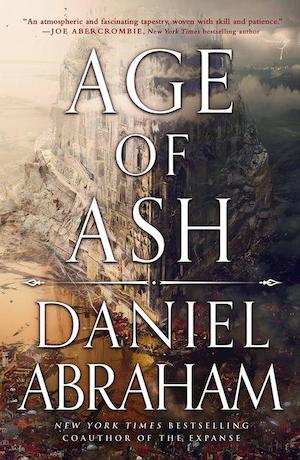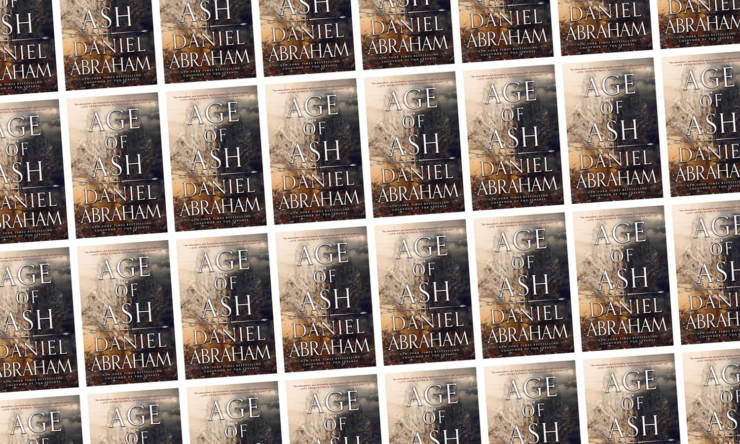There are books in which settings are like characters, and then there’s Age of Ash. Daniel Abraham’s new fantasy novel is set in the city of Kithamar, which for three hundred years “has been a free city, independent and proud and ruled by princes of its own rather than any distant king.”
Kithamar is full of slums and wealthy merchants’ houses, street rats and elegant priests. It’s home to two races who disagree on many things, including the history of the city. It’s also home to something stranger and darker and more mysterious—something Abraham shows but doesn’t explain in this book, the first novel of a trilogy. Age of Ash keeps its boots on the ground, tracing the streets of Kithamar primarily through the lives of those who might know them best: Alys and Sammish, a pair of street rats from the slums of Longhill, whose stories go a bit sideways when one of their pulls goes wrong.
I didn’t quite know what to expect from Age of Ash. The cover copy is a little vague, the reviews were a little vague, and the title gives very little away. I’ve read all of Abraham’s work as half of James S.A. Corey, but not his previous fantasy novels (an error in judgment that I certainly plan to correct). What I got is the kind of intimate fantasy I’m always looking for—the kind that builds from the ground up and unspools in a world that’s layered and rich and full of nuance; the kind that remembers that the stories of the street kids struggling to find a warm bed are just as compelling as stories set in polished halls among the ruling elite. Everyone has a place in Kithamar’s ecosystem, from the butchers to the highborn, the merchants to the brewers, the guardsmen to the child-minders. A city takes all kinds in order to work—and this one has more kinds than most.
Buy the Book


Age of Ash
Abraham casts a wide net, and draws in a complex, nuanced tangle of characters with few outright heroes or villains (and some absolute mysteries). His world feels familiar: The people in power have bought into a system that benefits them more than others, but ultimately serves something else entirely. Power is concentrated, and not exactly where even the rulers think it is.
Alys, though, doesn’t care about any of that. She cares about her brother, Darro, who meets an untimely end after he comes to her rescue when one of her pulls (pickpocket scams, basically) goes awry. Undone with grief, Alys is desperate to understand what happened. What she finds in his rooms—money, a strange knife, an even stranger candle—brings her into the orbit of the Daris Brotherhood, a religious order (one of many in Kithamar) whose rites and beliefs are deeply woven into the fabric of the city’s ruling class.
Sammish, who has a knack for being unnoticed, cares about Alys, and takes her own path to understanding what happened to Darro, and what it’s done to her friend’s life. She’s easier to be around; she goes poking around quietly, meets unexpected people, curls up at night behind a baker’s house with a neighborhood cat on her feet. You want good things for Sammish, who has a dream of a steady job and a cozy home—things that are so far from her experience that she’s almost uncomfortable with wanting them. “Something about wanting it that badly felt like crime,” she thinks.
Alys is much pricklier, and I love her for it. Abraham doesn’t go out of his way to put obstacles in front of his characters; they were born with obstacles on all sides, whether Alys’s poor, depressed mother or the simple fact of where she was raised. Her anger and guilt and grief turn her into a different version of herself, one who wears different clothes and hangs out in different parts of the city; she walls herself off, trying to become harder and colder, trying to live the life she imagined Darro led. But imaginations are faulty things, especially when grief is involved.
Alongside Alys’s quest, and Sammish on her heels, is the mystery of what happened to Kithamar’s dead prince, Bryn a Sal, whose unsteady reign is mostly unseen yet central to Age of Ash’s wider vision. Abraham has said that the three books in this series take place over the same time period, each focusing on different characters. In the details and the pauses, the secrets and the smoke, you can see just how the city’s tale is bigger than what Alys and Sammish understand—but that doesn’t make their part in it any less compelling.
This is a slow burn but not a slow book. It’s the kind of telling that wants to be savored, each chapter a new layer in how the reader understands the world through which the characters move. They aren’t defined by their roles or positions in life, but by how they live, how they choose: What the lady Andomaka does with her power, what Sammish does when she loses one paltry source of income. There are different kinds of need, and Abraham traces needs and choices and risks through the city’s filthy streets until he shows how desperation might lead a poor girl and an ancient being to a crossroads. (There’s a well-kept secret in Kithamar, one that suggests a sort of twisted mirror-image to a concept N.K. Jemisin works with in The City We Became—but to say more would be both spoilery and difficult; there’s much more to learn as this series continues.)
If you are, like I was, an Expanse fan wondering if you ought to start reading Abraham’s solo work, the answer I’d give is a resounding yes. There are some thematic overlaps—Kithamar is full of ordinary people trying to live with and around strange powers—but it’s Abraham’s sharp eye for details, and for just the right kind of details, that feels familiar, and that makes this novel sing. He knows what his characters would see or notice in a given scene, from the sediment at the bottom of a beer glass to the tiny shifts that signal the arrival of spring, and he knows when to step back a little and set the broader scene for us, to give the reader the tools to conjure our own versions of this fantastic city. He’s neither flowery nor economical as a writer, but considered and wise; this is the kind of prose that reads as if it came effortlessly. Age of Ash is at once immersive and intimate, a story about grief that’s also a story about how the world works. It’s going to be a long wait for volume two.
Age of Ash is available from Orbit.
Molly Templeton lives and writes in Oregon, and spends as much time as possible in the woods. Sometimes she talks about books on Twitter.











Here to say DANIEL ABRAHAM IS CRIMINALLY UNDERRATED JUST IN GENERAL, and also YES, you will love his other work. And why are you so cool, Molly???
I have read Abraham’s other fantasy work (and The Expanse as well), and have enjoyed them all. Currently, I am about 1/3rd of the way through Age of Ash, and so far it hasn’t resonated for me as much as I wanted it to. The writing is great, and the descriptions of Kithamar are very evocative and vivid. But I think the reviewer here put a finger on exactly my problem, which is that Alys is such a prickly character who keeps everything and everyone at such a distance (and makes some odd choices) that I am finding it frustrating trying to find any sympathy for her, despite her painful circumstances. Plus, much of the larger story is taking its own sweet time to come into view. Granted, I am only partway through, so it’s possible my opinion will turn around by the end. Thanks for the nonspoilery review!
Long Price Quartet and Dagger and Coin are both outstanding in very different ways. You are in for a treat.
Wonderful writing and with an incredibly boring story. Made it to about page 80 and stopped.
It’s a slow build. I’m about 2/3 through. It gets better. Can’t wait for the next book in the series.
The Long Price Quartet is the best fantasy saga since Earthsea and in my not very humble opinion, is every bit as good as the whole Earthsea saga and The Broken Earth Trilogy. Daniel Abraham is the only writer I’ve ever read who can make you understand and empathize with even the worst characters, and I can’t praise him enough. It did take a while for the plot of Age of Ash to get going but if you stopped, you missed something wonderful.
This book was ambitious, but in an unusual way; the ambition was `writerly’. More specificly, the ambition is that a genre writer.
What this book did that was new was the relationship of its structure to that of its sequels and the wider story. We are given enough scents of incidental details — starting with the prologue — that it is clear the end of the novel is roughly contemparaneous with the presumed end of the trilogy; that by the end of this novel the wider political events really have been resolved (there is a presumed red herring, a dangling expectation that this isn’t the case and a certain characters demise has to be guaranteed before a magical mcguffin is reconstructed, but my reading is that is Abraham being playful.)
What isn’t new is the setting — that was new 90 years ago, amongst thieves in Lankhmar. We get generic fantasy city, generic guilds of thieves, found families and actual families, lyrical prose, two viewpoint characters, with another mild textual feint in that the initial viewpoint character isn’t the `hero’, it is her lovesick friend who is the more reliable narrator (and a brief horrific viewpoint of one characters demise, just in case we hadn’t understood what the `ancient evil’ was).
The prose is lovely, if slow at first, and it is a perfectly accomplished genre novel, but what was missing was depth and genuine literary ambition. Telling a story in three widening gyres should have given Abraham a way to ruminate on the powerlessness of individuals, caught up in social change; on the relationship of the quotidien with tidal wave of unexpected events. And that is just in this novel; the unwritten sequels could have shown the strange impotence of the cultural or political elite, when they discover that proximity to power is not the same as influence — or power.
Instead, we got magical agency, for all characters. And a sense that the moral from the structure of the novels will be that for things to happen, it requires the contribution of some necessary few, perhaps self chosen, from the downtrodden poor (this novel), the leaders of state (presumably, next one), and then above that (the deposed magical beings we briefly meet). All of them, acting righteously, and presumably loosely independently — though how the gods are structured in this trilogy, and the particulars of whether anyone is orchestrating events, we will have to awit those novesl to determine.
Which is all well and good, and genuinely does count as thoughtful for a fantasy novel. But it fails completely at deeper levels, and isn’t a good language for thinking about contemporary events, and ones own role in society. For that, I guess we read actual literature…
*checks audiobook libraries* Dang, they don’t have it. *checks Goodreads* Oh, it debuted 13 days ago. I’ll try to remember to keep checking, and maybe try out some other Daniel Abraham books. I never heard of him before, and if the books have nice vivid prose and snarky, engaging characters, that’s all I ask of any fantasy story.